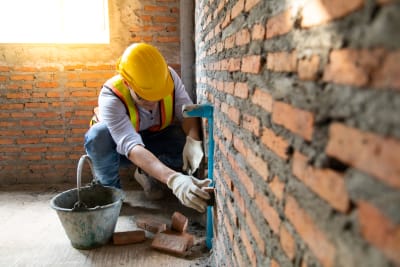Welders work with flame sources and several kinds of metal to fabricate components and structures that serve functional purposes. Being able to work in such a high-pressure - high-temperature environment is not just a product of innate talent alone.
It requires a great deal of training and mentorship from those who are already experts in the field. This is why one of the requirements to become a welder in New Jersey is to graduate from an appropriate training program and spend the necessary amount of time obtaining real-world experience.
Below is an in-depth guide detailing acquiring such training in New Jersey. We also take a look at the other requirements involved in the process.
How to Become a Welder in New Jersey
Below are the key considerations every aspiring welder in New Jersey must know before they start their careers.
Step 1: Have a School Diploma or GED
Before starting the journey to acquire training, aspiring welders in New Jersey must ensure they meet the basic requirements to secure admission into these programs. Usually, one of the key requirements is that candidates must have a high school diploma or GED.
Some schools also ask for background in relevant courses.
Step 2: Academic Education
Filling the above requirements would allow candidates to apply for formal education at the welding program organized by a college or trade school. Here, they may graduate with a certificate or an associate degree, depending on how long they would like to spend in training. Most academic programs for welders focus on both classroom instructions and practical applications.
Additionally, welders who want to push themselves all the way may enroll in welding engineering bachelor’s degree programs that can be completed in four years.
Step 3: Apprenticeship Programs
Apprenticeship programs are great options to receive hands-on training and highly comprehensive welding instructions over four years. Aspiring welders may choose apprenticeship programs as an addition to academic programs or in place of one.
One of the most important things when choosing an apprenticeship program is to ensure that the US Department of Labor accredits your program. Going with programs in New Jersey that are organized by trade unions typically ensures that this requirement is met.
Consider trades with similar paths:
Licensure & Certification Requirements
Welders in New Jersey are not required by law to obtain a license or professional certification. Those who pursue professional credentials only do so because it offers several benefits, such as better employment opportunities, career growth, and networking possibilities.
Welders nationwide look to the American Welding Society to provide a nationally recognized credential. The organization offers more than one certification category, depending on experience level and specialization.
Below are some of the categories of AWS professional credentials:
- Certified Welder,
- Certified Welding Educator,
- Certified Welding Inspector,
- Certified Welding Supervisor,
- Senior Certified Welding Inspector,
- Certified Welding Sales Representative,
- Certified Robotic Arc Welding, and
- Certified Welding Engineer.
Top Welding Schools in New Jersey
The following are the top welding schools in New Jersey.
Lincoln Technical Institute
Paramus, NJ Online + Campus
Lincoln Technical Institute is one of the most popular destinations for trade training in New Jersey. The school has multiple locations in the state, including campuses in South Plainfield, Union, and Mahwah.
Tuition
$29,370 - $46,000 per YearContact
(856) 722-9333
studentservices@lincolnedu.com
Camden County Technical Schools
Camden, NJ Online + Campus
Camden County Technical Schools is another top location for welding training in New Jersey. Because the school has various programs with different schedules, candidates may graduate anywhere between 3 to 24 months.
Tuition
FreeContact
(856) 767-7000
admissions@ccts.net
Bergen County Community College
Paramus, NJ Online + Campus
Bergen County Community College offers classroom instructions and hands-on training for aspiring welders in New Jersey. The school produces successful professionals in this field through its 12-credit welding technology program, which can be completed in just a few months.
Tuition
$157 - $323 per CreditContact
(201) 447-7200
admissions@bergen.edu
Notable Mentions
Other notable programs for aspiring welders in New Jersey include:
- Universal Technical Institute,
- Elite Welder Training and Testing School,
- Brookdale Community College,
- Essex County Vocational School, and
- Ocean County Vocational Technical School.
Explore welding schools by city:
Salary & Career Outlook
In New Jersey, welders earn an annual salary of $52,122, about 12% higher than the national average. This figure can get as high as $76,886 for the highest-paid welders in the state or as low as $35,427 for those in the bottom 10%.
Welders in New Jersey with a year’s experience earn an annual average salary of $47,560, while those with over 10 years on the job take home an average yearly salary of $59,556 based strictly on the experience level.
When grouped by location, the highest-paying destination for welders in New Jersey is Trenton, with an annual average salary of $55,925, followed by South Plainfield and Camden, with average yearly salaries of $54,534 and $54,292, respectively.
Welders in Newark earn an annual average salary of $52,453.





